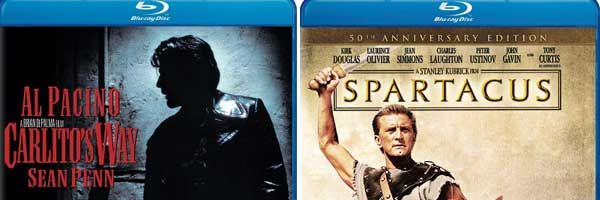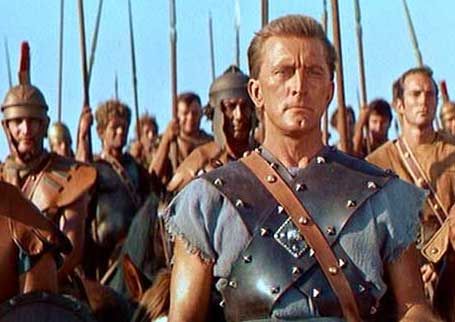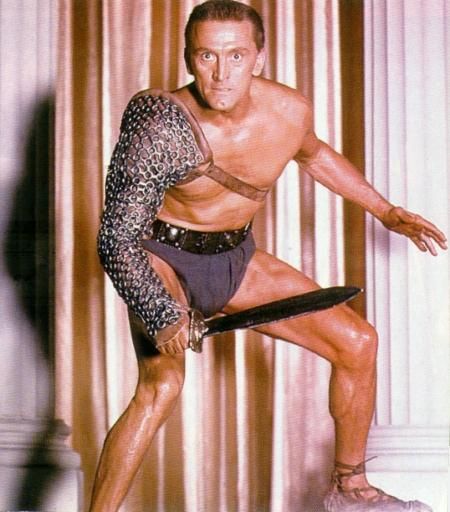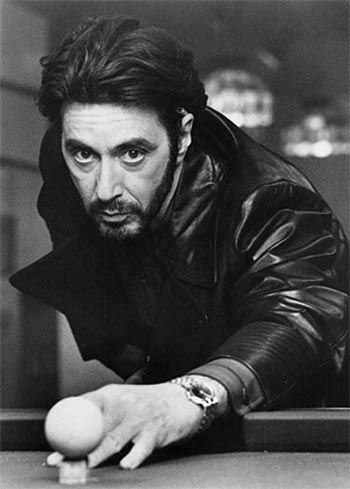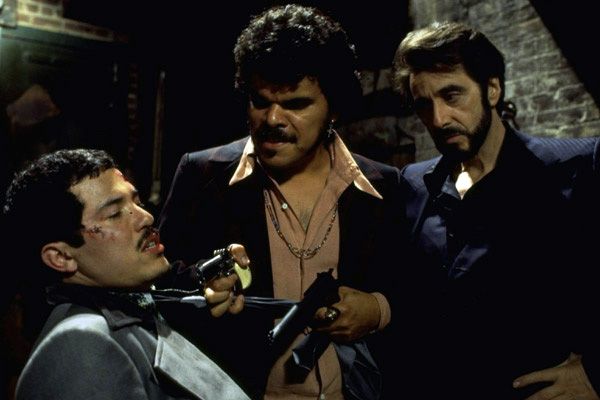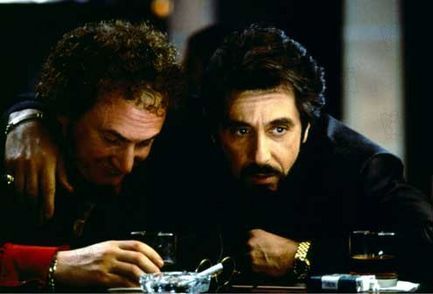Between Carlito’s Way and Spartacus on Blu-ray we see the greatness and weakness of Blu. When it comes to modern films - and with more films shot digitally - you don’t find a lot of recent films that look bad on the format. And even if a film is still shot on film (even 16mm, as with The Wrestler) the material is supervised by the makers, and the source material is going to be pristine. But when it comes to older films, the material can be lacking, and decisions can be made to smooth out or remove grain. With many of the creative team behind these films no longer with us, you could argue there’s no right answer, just preference. And then you have the case of The French Connection where the director changes the color palette on what appears to be his whim. No one’s going to complain about Carlito’s Way’s transfer, but a number of people are pissed off at Universal for the Spartacus Blu-ray, while others think it looks fine. My reviews of Spartacus and Carlito’s Way on Blu-ray are after the jump.
Spartacus was a huge turning point in Stanley Kubrick’s career. Anthony Mann was the original director and did some of the first act, but was fired and star Kirk Douglas helped get Kubrick the job after their success with Paths of Glory. Though Kubrick would spend the rest of his life working in the studio system, he never bothered with this sort of movie again, even if there are some faint echoes of the film’s scale and pageantry in Barry Lyndon. It’s probably the least personal of Kubrick’s movies, and seems stuck in the big screen mold without ever coming to life.
The story is of Spartacus (Douglas) a slave bought by Lentulus Batiatus (Peter Ustinov), and put in Batiatus’s gladiator school. Spartacus is trained, but when a bunch of spoiled rich people buy him and Woody Strode to fight to the death, Strode decides he won’t kill another slave, and instead throws his spear at his oppressors. That’s enough to start a slave revolt, and Spartacus begins to amass a following that puts him against Crassus (Laurence Olivier) and Julius Caesar (John Gavin). Spartacus has a number of men helping him (including Tony Curtis), and he is united with his love Varina (Jean Simmons), and may have some support from the inside from people like Gracchus (Charles Laughton) but foreign support is unlikely because a slave revolt might lead to the end of slavery.
Like most epic movies of the time, it’s got a huge scale that sometimes hurts the film when it feels back-lotty, and studio. Watching a film like Spartacus points out how amazing a film like Lawrence of Arabia is in its complete realization of scale and scope. Then again here you also have some truly epic battles, with the literal thousands of extras. The film is also good for being epic without dwelling too much on any religious themes (which in the world of Ben-Hur was a rarity as that was the popular way), but the film is curiously inert at times, and – of course – there’s the awkward presence of Tony Curtis, whose New York accent has long been a source of amusement for its out-of-place-ness. More curio than outright success, Spartacus still fascinates.
The film is presented in widescreen (2.20:1) and in DTS-HD 5.1. The transfer is questionable. It looks clean, but with Digital Noise Reduction, it can often produce a smeary almost CGI-like appearance. Such is what has led Robert Harris, who helped restore the film two decades ago, to label this Blu-ray version a travesty. I wouldn’t go that far, but with Blu-ray and 1080p transfers one hopes for the archival presentation and this is not it. Nor does it include any of the great and extensive extras from the Criterion Collection - including one of the bitchiest audio commentaries on record (everyone takes shots at someone on the track). Here you get some four deleted and alternate takes (8 min.), archival interviews with Peter Ustinov (3 min.) and Jean Simmons (4 min.), some behind the scenes footage (5 min.) with Anthony Mann on set, five newsreels (5 min.), five still galleries and the film’s theatrical trailer.
Less compromised is Carlito’s Way, Brian De Palma’s semi-sequel to Scarface, which reunited him with that film’s star, Al Pacino, for a much more nuanced and reflective look at the world of crime. Pacino plays Carlito Brigante, who begins the film getting out of prison due to the diligence of his lawyer David Kleinman (Sean Penn). Carlito finds a job running a nightclub, and there he meets Benny Blanco (John Leguizamo), who appears to be a mirror image of himself at that age. But it’s Kleinman that most threatens Carlito’s well being, as David is in too deep with some mobsters, and Carlito has to help him out of the debt he feels, even though Kleinman is willing to give him up to the cops.
Though the narrative is familiar, this is De Palma firing on all cylinders, and Pacino and Penn at the tops of their forms. You’ve also got supporting players like Luis Guzman, James Rebhorn, and Viggo Mortensen filling out the cast. The biggest obstacle for the film is Carlito’s love interest, and she’s played by Penelope Anne Miller. Miller was always a lightweight as an actress, and here she doesn’t bring much to what amounts to a not-too-meaty part to begin with.
This also has two of De Palma’s best set pieces, the set up in the pool room, and the end chase through the subway, and De Palma’s one of the great masters of the set piece. There are moments in both that are just dizzyingly great. But De Palma always knew where to put a camera. I’ve never been as crazy about the film as some of my fellow De Palma appreciators (which I affectionately called De Pologists) because of the love interest, but I also will watch this film at the drop of a hat.
Universal Blu-ray comes in widescreen (2.35:1) and in DTS-HD 5.1. The transfer here is pretty much perfect. Extras include all the content from the previous special edition DVD, “Brian De Palma on Carlito’s Way” (5 min.), nine deleted scenes (8 min.), and a making of (35 min.). The making of is especially good, as David Koepp recites one of my favorite De Palma anecdotes, in which the studio was complaining about the bar room scene that it was too long. De Palma’s response was “they’re absolute right… but what they mean is it’s not long enough.”

